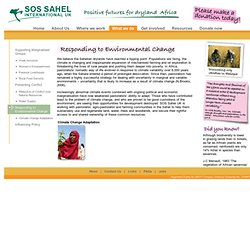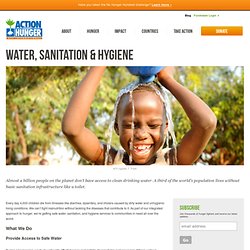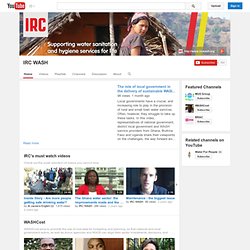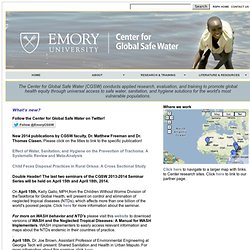

International Water Centre Resources Page. SOS Sahel. We believe the Sahelian drylands have reached a tipping point.

Populations are rising, the climate is changing and inappropriate expansion of mechanised farming and oil exploration is threatening the lives of rural people and pushing them deeper into poverty. In Africa, pastoralists’ nomadic way of life evolved in response to climate variability over 6,000 years ago, when the Sahara entered a period of prolonged desiccation. Since then, pastoralism has remained a highly successful strategy for dealing with uncertainty in marginal and variable environments – uncertainty that is likely to increase as a result of climate change (N.Brooks, 2006). Increasingly abnormal climate events combined with ongoing political and economic marginalisation have now weakened pastoralists’ ability to adapt. Those who have contributed least to the problem of climate change, and who are proven to be good custodians of the environment, are seeing their opportunities for development destroyed.
Action Against Hunger WASH. Every day 4,000 children die from illnesses like diarrhea, dysentery, and cholera caused by dirty water and unhygienic living conditions.

We can’t fight malnutrition without tackling the diseases that contribute to it. As part of our integrated approach to hunger, we’re getting safe water, sanitation, and hygiene services to communities in need all over the world. What We Do Provide Access to Safe Water During emergencies, we truck water into affected areas and installs storage tanks and reservoirs. Promote Sanitation & Hygiene To prevent outbreaks of disease during a crisis, our teams distribute hygiene kits and build latrines and hand-washing stations. Ensure Lasting Change Our commitment to community participation ensures long-term capacity: we train community-based water committees to manage their water and sanitation infrastructure themselves, and organize village health teams to model good sanitation and hygiene practices for their communities long after we leave an area. IRC International Water and Sanitation Centre. Ircwater's Channel. Local governments have a crucial, and increasing role to play in the provision of rural and small town water services.

Often, however, they struggle to take up these tasks. In this video, representatives of national government, district local government and WASH service providers from Ghana, Burkina Faso and Uganda share their viewpoints on the challenges, the way forward and the role of national governments and development partners in the support of local governments. Ghana team Vida Duti (overall coordination)Tyra Kumasi (interview)Victor Narteh Otum (camera)Abubakari Wumbei (video coordination)Seyram Asimah (transcription) Burkina FasoJuste Nansi (overall coordination)Nourou (interview, camera, transcription) UgandaJane Nabunnya (overall coordination)Robert Nkambo (camera and editing)Lydia Mirembe (interview and editing)Martin Watsisi (field coordination) IRC 2014 Show less.
Emory CGSW. The Center for Global Safe Water (CGSW) conducts applied research, evaluation, and training to promote global health equity through universal access to safe water, sanitation, and hygiene solutions for the world's most vulnerable populations.

What's new? Follow the Center for Global Safe Water on Twitter! New 2014 publications by CGSW faculty, Dr. Matthew Freeman and Dr. Thomas Clasen. Effect of Water, Sanitation, and Hygiene on the Prevention of Trachoma: A Systematic Review and Meta-Analysis Child Feces Disposal Practices in Rural Orissa: A Cross Sectional Study Double Header! On April 15th, Kelly Gallo, MPH,from the Children Without Worms Division of theTaskforce for Global Health, will present on control and elimination of neglected tropical diseases (NTDs), which affects more than one billion of the world's poorest people. For more on WASH behavior and NTD's please visit this website to download versions of WASH and the Neglected Tropical Diseases: A Manual for WASH Implementers. 1. Water.